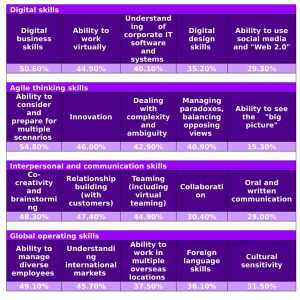How the re-positioning of employee skills will transform workplace
In a study conducted by Oxford Economics, it identified four broad areas where skills will be in the greatest demand over the next 5 to 10 years. These include:
 1. Digital Skills
1. Digital Skills
Currently employment is experiencing the fastest-growing economy for a high demand in technically skilled workers. In particular, the emergence of social media is putting a premium on developing new forms of digital expression and marketing literacy. Alike, the rapid expansion and investment of the UK tech industry we’ve seen creation and adoption of new digital technologies, which has enabled business software and systems to build internal efficiencies that will remain a high priority, meaning a continued high demand for employees possessing the digital skill.
2. Agile Thinking
In a period of sustained uncertainty, where economic, political and market conditions can change suddenly, agile thinking and the ability to proactively prepare for multiple scenarios is paramount.
To succeed in the changing workplace of the future, HR executives also put a high premium of innovative thinking, dealing with complexity and managing paradoxes.
Strategic People have used 2019 as a good playing field to adapt the different ways our clients work, in the hope to gain further professional understanding as well as individual consultant success. Recently the team took part in an Agile Day, compiling to do lists and creating visual 3 column tables of the wall, full of colourful posits representing each stage of their task. We tracked the results to compare a standard working day and found an increase of 120% increase on BD calls. Below is the example of our Agile Board:

3. Interpersonal and communication skills
As a majority rule, most HR executives believe that co-creativity and brainstorming skills will increase in demand, as will relationship building and collaboration. This has already been evidenced in the shift from command and control organisations to more fluid co-working styles. This will continue to align strategic goals, build census and encourage collaboration amongst all departments of work. The exciting challenge will bring a vast variety of geographies and cultures to encompass working enterprises of the future.
4. Global Operating Skills
Reflecting the impetus of firms to expand in markets around the world, the facility to manage diverse employees is seen as the most important operating skill over the next 5 to 10 years. In the UK, companies are embracing the merge of global talent to penetrate new markets, expand existing knowledge and develop as international businesses. There will be a further increase where home market products and services will be tailored to the tastes of overseas customers and then bought back home to mature expanding markets.
With all the current and predicted changes the marketplace is undergoing it is important to align HR strategies with business transformation objectives. Oxford Economics research shows the increasing priority put on integration/synergy as a transformation tool. Though it can be difficult to navigate in times of constant change, aligning business and talent management keeping the above skill sets in mind, will be crucial to future company success.


